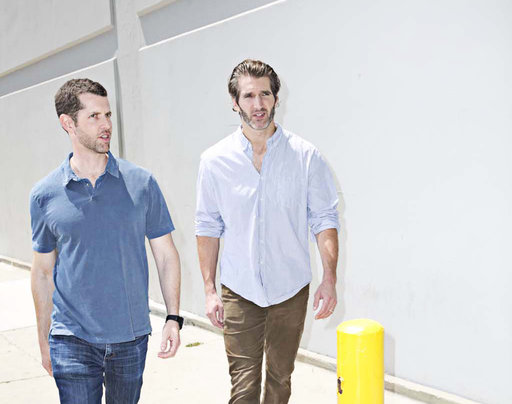Mike Fleming Jr. is Deadline’s film editor. This story appeared in the June 19 issue of AwardsLine.
Taking the reins of a book series with a devoted following can be daunting for any producer. But for Game of Thrones’ executive producers David Benioff and D.B. Weiss, the solution to adapting George R.R. Martin’s fantasy bestsellers was to be diehard fans of the source material. Weiss and Benioff also enjoy a fruitful open dialogue with the author, who Weiss says, “ultimately understands that we live and breathe this show. Our devotion to it is total. It’s like a cult.” Their ambition is evident in the scope of the show, which Benioff reveals has a budget of “more than $5 million” per episode, making it among the most expensive series produced for television.
How has the fact that you come from a feature background impacted what we see onscreen? Was it a tough transition to TV?
Weiss: For the first season, we were always shooting three first units, and at some point, we came in at four units going at once. And being naïve as to how television works, we (thought) we’d write the scripts but that we’d also be on set every day. But when you have four sets going on in three different countries, you realize it’s not actually physically possible for you to be on set every day. (It was) that first time you start to feel that feeling that there’s something going on somewhere else where I’m not, and where David’s not. To a certain extent, it was just slowly realizing what it meant to be working in a television world, where the time pressures are as intense as they are, while still trying to deliver a viewing experience (that) visually is more informed by feature film.
Benioff: One of our inexperiences showed itself. In the first season, our shows started coming in really short. For HBO, it’s supposed to be around 52 minutes, 54, something like that, and we had a bunch of episodes that were clocking in at 40 minutes. It was kind of a crisis because we didn’t really have more money left, and we had to somehow come up with an extra 90 minutes.
Weiss: Yeah, we had to create, like, 100 pages in two weeks.
Benioff: And they had to be inexpensive scenes, so they were basically all two actors in a room. We ended up writing 15 scenes or something over the course of the first season, and they ended up being some of our favorite scenes of the season. Because we knew the actors, so at this point, we weren’t just writing for an abstraction anymore.
Describe your relationship with Martin and how you factor in his creative wishes and your own instincts for storytelling.
Benioff: First of all, I’d say it’s a really good relationship, and the whole reason we wanted to do the series was because we love the books. We said, “We want to tell the whole story—as much of it as we possibly can.” But that also means there are going to be changes, and we’ve definitely had disagreements; every season we have disagreements about certain things.
Any come to mind specifically?
Weiss: Lots of it. The stuff we’ve talked about most recently applies to the fourth season and beyond, so I wouldn’t want to get into that. But in the abstract, it usually comes down to us feeling like we have to limit the number of new faces we see on the screen. So he talks about butterfly effects that run through the whole story, and we understand that those are there. But ultimately we need, for the good of the show, to go around those effects rather than dumping more information into the show than people can handle. In the broader sense, I’d say that’s where most of the disagreement comes from. George has been a great partner.
Benioff: George understands that we don’t make these kinds of decisions flippantly or lightly, and we always want to give him a chance to kick back at us. Sometimes we’ll say, “You’re right,” and it’s worth rerouting something we were planning.
Weiss: It drives him nuts that characters are fighting without wearing their helmets.
Benioff: That’s one of the places where we talk about the difference between the source material and the medium you’re transporting it to. It doesn’t matter whether a character has a helmet on in the book because we can access what’s inside the helmet. But in TV, we can’t do that unless we can see the guy’s face. It’s a mundane-sounding thing, but it impacts the things you can do.
What in the books did you consider but find too sordid to convey on the screen?
Weiss: A lot of the younger people in the book we aged up. Like Daenerys is 13 in the book. Obviously, we have no interest in representing that, and HBO has even less interest. There are things that ethically and morally you just can’t put on screen.
I’m sure you’ve answered this question several times before, but are you in this until the end?
Weiss: I hope so. We went into this with the ambition to tell this story through to the end. We’ve been given this great gift of this huge canvas to tell this massive story from these beautiful books by George Martin, and the idea of telling this whole epic through to the end is incredibly compelling. We’d love to be there to shoot the last scene.


I hope it does make it to the end of the 7th book. As long as more and more people watch the show there should be no problem, budget wise. Right now GOT is beating out True Blood for most watched audience for HBO.